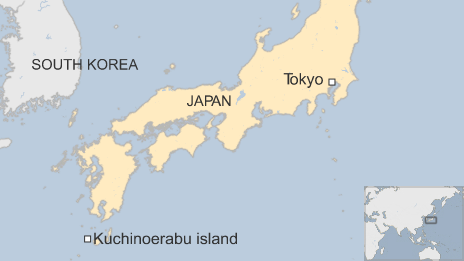Japan volcano: Mount Shindake erupts, forcing evacuation
- Published
Footage showed the moment the volcano erupted
A volcano has erupted on an island in Japan, spewing black clouds of ash up to 9km (5.6 miles) into the sky and forcing the evacuation of inhabitants.
One person was reported to have suffered minor facial burns from falling debris as Mount Shindake erupted on Friday morning.
Most of the 137 residents of Kuchinoerabu island were evacuated by boat.
One spoke of how the sky turned dark as the volcano erupted.
Flows of rock and super-heated gas travelled down the mountain and into the sea, turning the main harbour grey and the sea-water murky.
Shindake erupted last year for the first time since 1980, when a 14-year period of activity ended. Several people died in a 1933 eruption.
"There was a really loud 'dong' sound of an explosion, and then black smoke rose, darkening the sky," Nobuaki Hayashi, a community leader, told national broadcaster NHK. "It smelled of sulphur."

The fire and disaster management agency has raised the alert level for the island to five, its highest level. But officials say there is no threat to human life.
Nevertheless, the eruption was big news, and Prime Minister Shinzo Abe appeared on television to pledge that he had mobilised "all functions of government" to ensure the islanders' safety.
Volcano experts have warned that more eruptions on a similar scale could follow.
Japan sits at the junction of several tectonic plates and is one of the world's most seismically active countries.
Some have linked an surge in recent volcanic activity to the devastating earthquake that struck on 11 March 2011, triggering a massive tsunami.
In September last year, Mount Ontake in central Japan erupted unexpectedly, killing dozens of hikers.